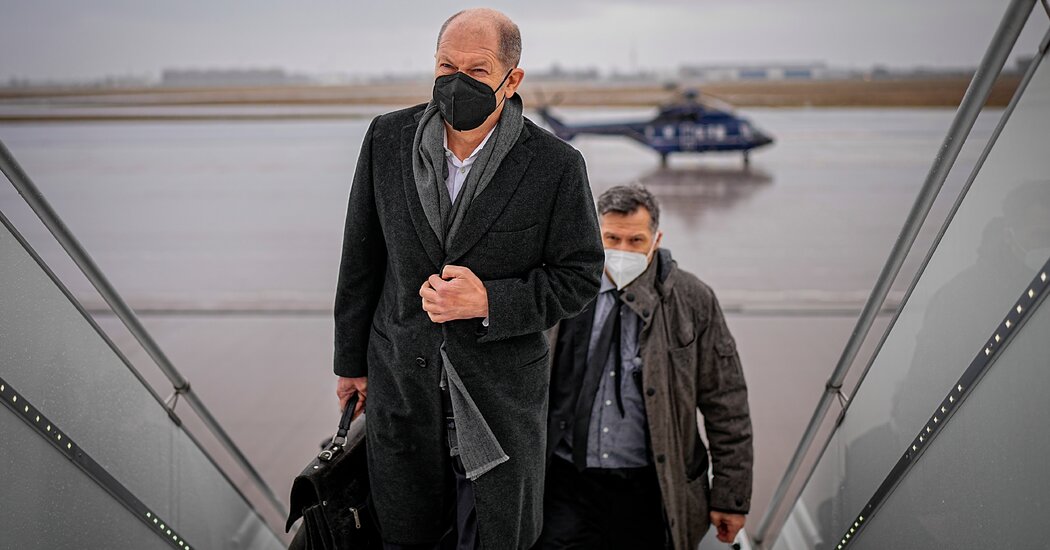
BERLIN — The United States and its NATO allies are moving to bulk up their military commitments in the Baltics and Eastern Europe as the standoff with Russia over Ukraine deepens.
Denmark is sending fighter jets to Lithuania and a frigate to the Baltic Sea. France has offered to send troops to Romania. Spain is sending a frigate to the Black Sea. President Biden has put thousands of U.S. troops on “high alert.”
And then there is Germany. In recent days Germany — Europe’s largest and richest democracy, strategically situated at the crossroads between East and West — has stood out more for what it will not do than for what it is doing.
No European country matters more to European unity and the Western alliance. But as Germany struggles to overcome its post-World War II reluctance to lead on security matters in Europe and set aside its instinct to accommodate rather than confront Russia, Europe’s most pivotal country has waffled in the first crucial test for the new government of Chancellor Olaf Scholz.
Germany’s evident hesitation to take forceful measures has fueled doubts about its reliability as an ally — reversing the dynamic with the United States in recent years — and added to concerns that Moscow could use German wavering as a wedge to divide a united European response to any Russian aggression.
President Biden held a video call with European leaders on Monday night, saying it went “very, very, very” well, and beforehand Chancellor Scholz reiterated that Russia would suffer “high costs” in case of a military intervention. But Germany’s allies have still been left to wonder what cost it is prepared to bear to confront possible Russian aggression.
“Within the European Union Germany is crucial to achieve unity,” said Norbert Röttgen, a senior conservative lawmaker and advocate of a more muscular German foreign policy. “Putin’s goal is to split the Europeans, and then split Europe and the U.S. If the impression prevails that Germany is not fully committed to a strong NATO response, he will have succeeded in paralyzing Europe and dividing the alliance.”
As Russia held military drills near the Ukrainian border on Tuesday, Mr. Scholz met with President Emmanuel Macron of France in Berlin, warning Moscow that “a military aggression calling into question the territorial integrity of Ukraine would have grave consequences.”
But the German government has not only ruled out any arms exports to Ukraine — it is also holding up a shipment of nine Communist-era howitzers from Estonia to Ukraine.
Mr. Scholz and other senior Social Democrats in his government and party have been vague about whether shuttering the controversial Nord Stream 2 undersea gas pipeline from Russia to Germany would be part of an arsenal of possible sanctions against Russia, insisting it was a “private -sector project” and one “separate” from Ukraine.
Friedrich Merz, the designated new leader of Angela Merkel’s opposition conservative party, meanwhile, has warned against excluding Russian banks from the Swift payment transactions networkthat handles global financial transfers because it would “harm” Germany’s economic interests.
Germany’s muddled stance has been especially unsettling to Ukraine and its eastern neighbors. The Ukrainian foreign minister, Dmytro Kuleba, accused Berlin of effectively “encouraging” Russian aggression. Other were no less scathing.
“Berlin is making a big strategic mistake and putting its reputation at risk,” Laurynas Kasčiūnas, chairman of the national security committee of the Lithuanian Parliament told the public broadcaster LRT.
Artis Pabriks, Latvia’s foreign minister, said these days German deterrence was “not sending weapons to Ukraine, but a field hospital.”
The strain in the alliance came to a head last weekend when the chief of the German Navy said that President Vladimir V. Putin of Russia deserved “respect” and that Crimea would “never” be returned to Ukraine. Vice Adm. Kay-Achim Schönbach, resigned, but the backlash was swift and emotional.
“This patronizing attitude subconsciously also reminds Ukrainians of the horrors of the Nazi occupation, when Ukrainians were treated as subhuman,” said Andriy Melnyk, Ukraine’s ambassador to Germany.
Washington has been at pains to publicly stress its trust in Berlin, while privately lobbying Mr. Scholz to take a harder line.
President Biden sent several emissaries to Berlin. William J. Burns, head of the C.I.A., presented the chancellor with the latest intelligence on Ukraine. Secretary of State Antony J. Blinken, who stopped in Berlin before meeting his Russian counterpart in Geneva last week, said on Sunday he had “no doubts” over Germany’s determination to stand up to Russia.
“It is telling that the U.S. has to publicly reaffirm its trust in Germany,” Jana Puglierin of the Berlin-based European Council on Foreign Relations said. “That used to be a given.”
The wrenching debate over where precisely German loyalties lie is not new. Russian-German relations have been shaped by centuries of trade and cultural exchange but also two World Wars. The Cold War added yet another layer of complexity: West Germany became firmly embedded in the Western alliance while East Germany lived under Soviet occupation.
“Why do we see Russia differently from the Americans? History,” said Matthias Platzeck, chairman of the Russian-German Forum and a former chair of Mr. Scholz’ Social Democrats. “Germany and Russia have been linked for a thousand years. The biggest Russian czarina was Catherine the Great, a German, who incidentally made Crimea part of Russia.”
“We attacked Russia twice, and the second time it was a genocidal war,” he added. “Twenty-seven million Soviets died, 15 million Russians among them.”
Understand the Escalating Tensions Over Ukraine
That does not mean that Germany has failed to stand up to Russia in recent years. Germany commands a multinational NATO battle unit in Lithuania and helps monitor Baltic airspace for Russian interference. It is planning to send fighter jets to Romania next month to do the same there. (And yes, it is also sending a field hospital to Kyiv next month.)
In 2014, when Mr. Putin invaded Ukraine and annexed Crimea, it was Ms. Merkel who rallied neighboring countries in East and West to back tough sanctions on Russia.
But the change of German leadership after 16 years of Ms. Merkel has put in place a government that is divided on how hard a line to draw with Russia.
Mr. Scholz’s Social Democrats have traditionally favored a policy of working with the Russians. In the 1970s, Chancellor Willy Brandt engineered the policy of rapprochement with Moscow during the Cold War, while the last Social Democratic chancellor, Gerhard Schröder, is not just a close friend of Mr. Putin (he celebrated his 70th birthday with him) but has been on the payroll of Russian energy companies since 2005.
The new Green Party foreign minister, Annalena Baerbock, has been more outspoken on being tougher on Russia. But even she has drawn a line on sending German arms to Ukraine, citing “history.”
The arms-export policy in many ways embodies the modern German paradox of a nation that knows it has to assume more leadership responsibility in the world but is not quite ready to act that way.
“The idea that Germany delivers weapons that could then be used to kill Russians is very difficult to stomach for many Germans,” said Marcel Dirsus, a political analyst and nonresident fellow at the Institute for Security Policy at Kiel University.
The government has been even more divided over Nord Stream 2, a gas pipeline owned by Gazprom, Russia’s state-owned energy company, that many fear will hand Mr. Putin an easy way to exert influence over America’s European allies.
Russia is Europe’s main supplier of natural gas. Once Nord Stream 2 is operational, Gazprom would be able to sell additional gas to European customers without paying transit fees to Ukraine.
Championed by Ms. Merkel in 2015, a year after Russia first invaded Ukraine, Nord Stream 2 has long inflamed Washington and European capitals alike.
While Ms. Baerbock, the Green Party foreign minister, has not been shy about expressing her hostility toward the project, Ms. Merkel and Mr. Scholz have defended it on economic and energy security grounds and long ruled out using it as leverage in talks about sanctions.
It was only last week, standing next to the NATO general secretary, that the chancellor shifted his language, saying that “everything” would be on the table in case of a Russian invasion.
“Putin gave NATO a new reason to exist,” said Mr. Dirsus of the Institute for Security Policy in Kiel. “Who knows, maybe he can teach the Germans once and for all that the world has changed and they need to be prepared to pay to defend peace.”
Christopher F. Schuetze contributed reporting from Berlin and Andrew Higgins from Warsaw.







